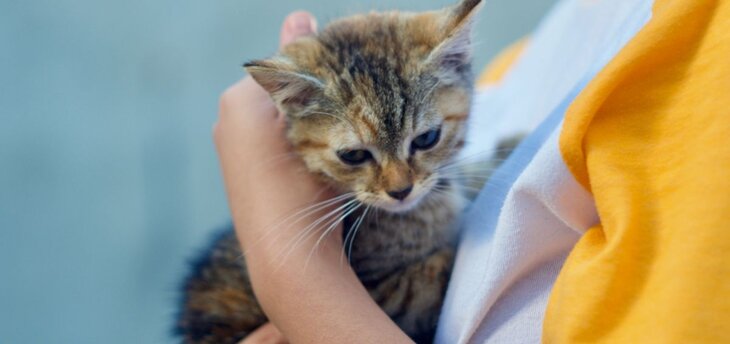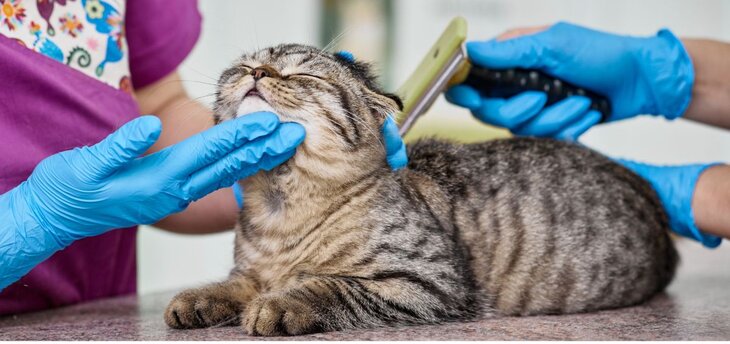Cat Adoption Guide: A Veterinarian's Advice
As a veterinarian, I am thrilled to share insights and guidance on one of the most rewarding decisions you can make – adopting a cat. Cats are wonderful companions that can bring joy, warmth, and countless unforgettable moments into our lives.
However, like any significant commitment, adopting a cat requires careful consideration and preparation. In this comprehensive guide, I will walk you through the essential steps to ensure a smooth transition for both you and your new feline friend.
Table of Contents:
Reflect on Your Lifestyle
Before rushing into adopting a cat, the first thing to do is to take a moment to reflect on your lifestyle. Cats, while known for their independent nature, vary widely in energy levels, temperaments, and social needs.
Consider factors such as:
- Your work schedule
- Living space
- Personal preferences
Are you looking for an active playmate or a laid-back companion? Understanding your lifestyle will help you choose a cat with characteristics that align well with your daily routine.
3 million cats enter shelters every year,
while only 2 million cats get adopted
Choose Adoption
Most animal shelters in America are overrun with cats. According to the ASPCA, approximately three million cats enter animal shelters each year and each year two million cats are adopted from those shelters. This leaves an abundance left up for adoption.
It’s almost a guarantee that if you go to an animal shelter to adopt a cat, there will be plenty to choose from. Countless cats need loving homes, and adoption provides them with a second chance at a happy life.
When you adopt, you not only save a life but also contribute to reducing the population of homeless animals.
Visit your local shelters, meet the cats, and connect with the dedicated staff who can guide you in finding the perfect match for your family situation.
Prepare Your Home
Creating a safe and welcoming environment is crucial for your new feline friend's well-being. Before bringing your cat home, ensure you have essential supplies such as:
- A litter box
- High-quality cat food
- Food and water bowls
- A comfortable bed
- Scratching posts
- Toys
You may already have other cats. One useful tool I usually recommend for pet owners who have recently added a new member to their household is a Feliway diffuser. Feliway is a feline pheromone that can help cats cope with the stress of a new home, as well as help the other cats get used to having a new housemate.
It’s also a good idea to have an appropriate number of litter boxes. This means having at least one litter box for each cat, plus an extra. This can help cut down on stress, which can lead to cystitis and other urinary issues in cats.
Designate a quiet and cozy space where your cat can retreat to if feeling overwhelmed. Cats appreciate consistency, so establishing a routine from the beginning will help them adjust more easily.
Schedule a Veterinary Visit
Once you've chosen your new furry family member, schedule a visit with your local veterinarian.
A head-to-tail examination can help you to understand any current issues your cat may be having as well as any future issues that may arise. This will help to uncover any underlying issues and ensure your cat is in good health.
Discuss vaccinations, spaying/neutering, and microchipping with your veterinarian. Establishing a relationship with your veterinarian early on will enable you to address any questions or concerns, and it sets the foundation for proactive healthcare.
Want to get reimbursed for 60-100% of eligible vet bills?
Consider enrolling in pet insurance to lower your out-of-pocket costs.
Nutrition Matters
Feeding your cat a balanced and nutritious diet, at the correct amount, is fundamental to their overall health and well-being. Given their sedentary nature, cats are very prone to becoming overweight.
Almost 60% of cats are considered overweight. While having an overweight cat may have become popularized by cartoons such as Garfield, there are major health implications for your cat becoming overweight.
Obese cats develop an increased risk for:
- Cancer
- Diabetes mellitus
- Heart disease and hypertension
- Osteoarthritis and faster degeneration of affected joints
- Urinary bladder stones
- Anesthetic complications
It is important to feed your cat the correct amount of the right food. Consult your veterinarian to determine the best diet based on your cat's age, weight, and any specific health considerations.
Remember to provide fresh water at all times and avoid feeding your cat human food, as certain items can be toxic to them.
If you have multiple cats, it’s important to feed them separately and avoid just leaving food out all the time. This can lead to overfeeding and also makes it impossible to know if one of your pet’s feeding habits are abnormal, often a first sign of sickness.

Enrichment and Playtime
Cats are playful and curious creatures that require mental and physical stimulation. Invest in interactive toys, scratching posts, and climbing structures to keep your cat engaged.
Regular playtime not only provides exercise but also strengthens the bond between you and your feline friend.
Experiment with different toys to discover what your cat enjoys the most and adapt the play routine accordingly.
Having two cats can also create an outlet for play for both of them. I do think some cats are happier with another playmate in the house. If you have multiple cats, create an area where they can be separated from each other if needed as extended periods of playtime can sometimes cause stress.
Grooming and Hygiene
Monitoring and maintaining your cat's grooming and hygiene is essential for their comfort and health.
One of the first signs of sickness in cats is a failure to groom themselves properly. This can lead to skin irritation and painful mats that cause the cats to be hypersensitive and become aggressive. Brush your cat's fur regularly to prevent matting and reduce shedding.
Supplementing nutritionally with omega-3 fatty-acids can help to increase the quality of the fur and skin. Depending on the breed, some cats may require more frequent grooming.
Additionally, keep their litter box clean by scooping it daily and providing fresh litter regularly.

Veterinary Care Throughout Their Life
Having a great relationship with your veterinarian is very important for your feline’s health. Regular veterinary check-ups are crucial for ensuring your cat's long-term health and detecting issues. Your veterinarian will monitor their weight, dental health, and overall well-being.
Routine bloodwork for your cat is an important facet of their care. Cats do an extremely good job of hiding their diseases as they get sick and only show signs after it’s been going on for a while. Tracking the trends in bloodwork values year to year can help your veterinarian detect diseases before your cat begins to show symptoms.
Staying up-to-date on vaccinations and preventive care, including flea and tick prevention. Be observant of any changes in behavior, appetite, or litter box habits, as these can be early indicators of potential health issues.
Pet insurance can cover the cost to treat and diagnose unexpected accidents and illnesses — but only if you're enrolled before they occur.
Establishing a Bond
Building a strong bond with your new cat takes time and patience. Allow your cat to approach and initiate interactions, respecting their boundaries.
Spend quality time together, whether it's through play, gentle petting, or simply being present.
Cats thrive on routine, so consistency in your interactions will help strengthen the bond over time.
Don’t let your new kitten play by biting your hands, as this can continue into their life and lead to bad behavioral habits.
If you have multiple cats, give them time to establish bonds.
Be Patient and Understanding
Lastly, remember that each cat is unique, and the adjustment period may vary. Some cats may acclimate quickly, while others may take more time to feel comfortable in their new home. Be patient, understanding, and provide a calm and loving environment. Your commitment and care will be rewarded with a lifetime of companionship and joy.
Adopting a cat is a significant and fulfilling commitment that requires thoughtful preparation. By considering your lifestyle and following these essential steps, you are laying the foundation for a harmonious and loving relationship with your new feline friend.
Your cat's health is priceless; let's protect it together.
Do you want to find the best pet insurance?
Let's analyze your pet's breed, age, and location to find the right coverage and the best savings. Ready?
Analyze My PetAbout Pawlicy Advisor
The pet insurance marketplace endorsed by veterinarians, at Pawlicy Advisor we make buying the best pet insurance easier. By comparing personalized coverage and pricing differences we can save you a ton of money, up to 83% in some instances!
Instantly Compare Pet Insurance Plans
Guides
Determine If Pet Insurance Is Worth It
Comparison Charts
Find Your State
Dog Insurance
DVM
Adam Thompson, DVM, is a small animal veterinarian at a private practice in north Alabama. He enjoys educating pet owners and providing them with the best care possible for their pets. He has a passionate interest in nutrition, dentistry, dermatology, and preventative medicine. Dr. Thompson is married to his wife (also a veterinarian), and they have two children. They also have a Boston Terrier mix named Newman.
